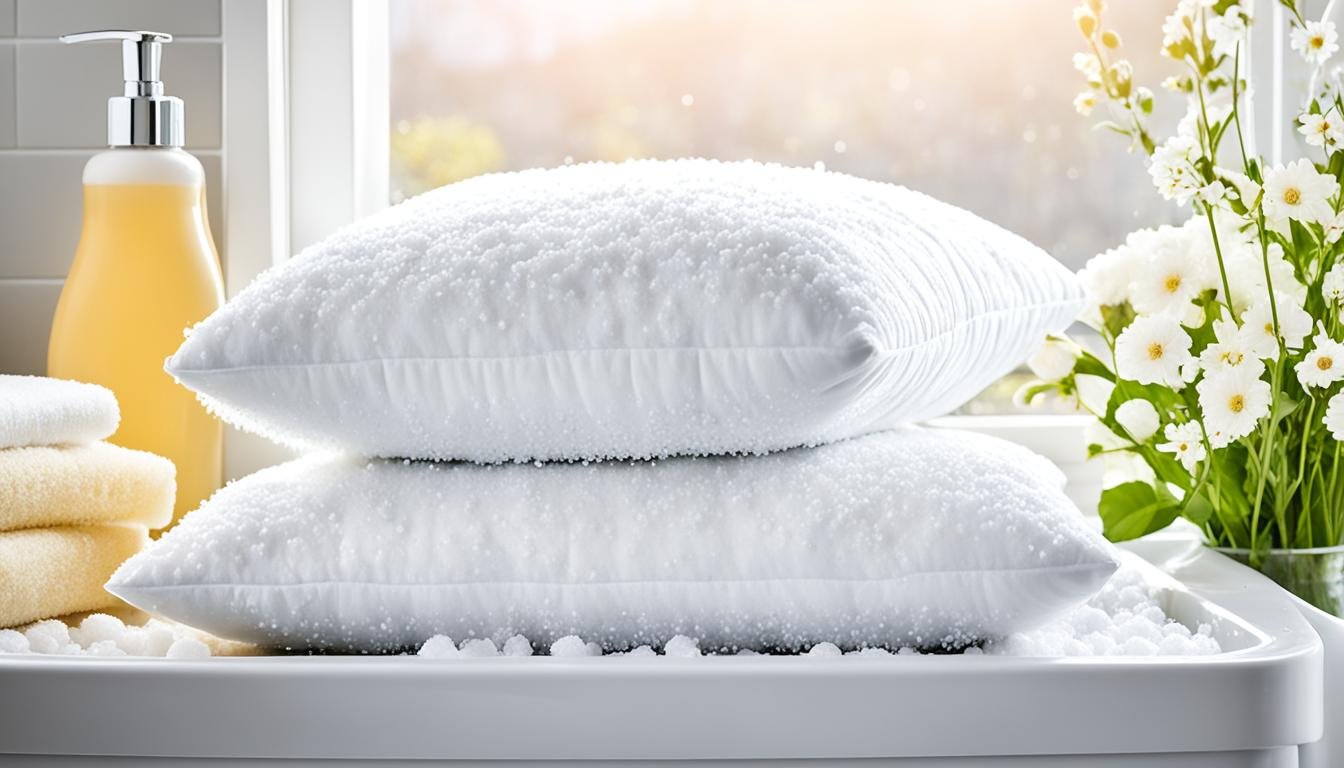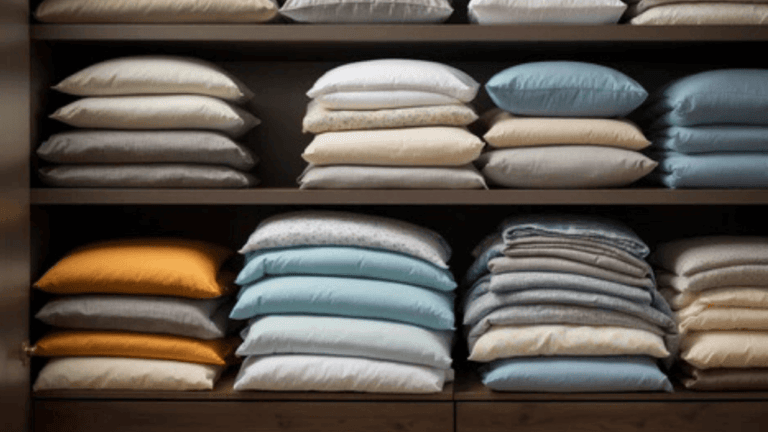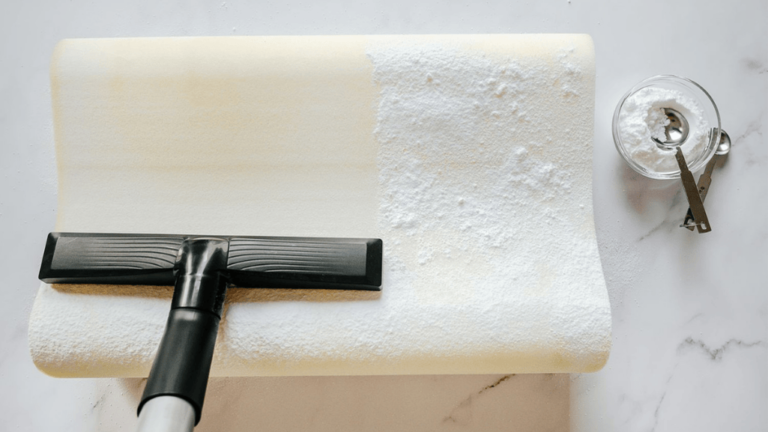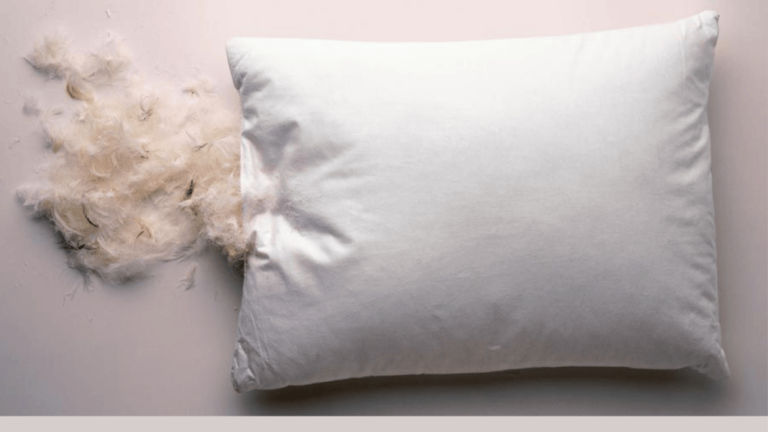To keep your sleeping area clean and fresh, regular pillow cleaning is a must. Pillows gather dead skin, dust mites, and other dirt. They need as much care as your bed sheets and blankets. Experts suggest cleaning pillows every three to six months. This tip applies to most kinds like cotton, feather, down, and fiberfill.
You can wash these in a machine on a gentle, warm cycle. Always look at the label for any special cleaning steps. After washing, get rid of the extra water, then dry them on a low heat. Fluff them to keep their shape. However, you can’t toss memory foam or latex pillows in the wash. For these, hand washing is the best method. how to wash pillows?
To hand wash them, fill a basin with lukewarm water. Toss in a bit of detergent and white vinegar. Mix it up and then gently press and squeeze the pillows in this solution. Next, make sure to rinse them well. After rinsing, place the pillows on clean towels to dry. If they still smell, either let them sit in the sun or sprinkle a little baking soda on them.
Key Takeaways:
- Regularly clean your pillows every three to six months to maintain a fresh sleep environment.
- Most pillows can be machine washed in warm water on the gentle cycle, but always check the label for specific instructions.
- Memory foam and latex pillows should be cleaned by hand in a mixture of lukewarm water, detergent, and white vinegar.
- Dry pillows on a low heat setting or air dry them, and fluff to restore their shape.
- If needed, eliminate odors by placing pillows in direct sunlight or sprinkling them with baking soda.
How Often to Clean Your Pillows
It’s a good idea to clean your pillows every three to six months. This helps keep your sleep space fresh and free of germs. Dust mites, bacteria, and oils can build up on pillows.
Sweating or sleeping with pets can mean you need to clean your pillows more often. Signs your pillows need a wash include yellowing, bad smells, and losing fluff. These signs show dirt and allergens are affecting your sleep and comfort.
Looking after your pillows well can make them last longer. Still, it’s best to change them every 1.5 to 2 years for new ones. This keeps your sleeping spot clean and your neck well supported. Over time, old pillows build up bacteria and lose their support.
Just cleaning your pillows isn’t the only care they need. Using pillow protectors or cases is great for keeping them fresh. These covers shield your pillows from sweat, skin, and bacteria. They also help fight allergens.
Letting your pillows air out is also key. Fresh air dries out moisture and refreshes the pillow. Try not to eat in bed to avoid tough stains and bad smells.
If you’re ill, remember to change or wash your pillowcases a lot. This keeps germs from spreading and makes your sleep area healthier.
These tips will help keep your pillows clean, fresh, and comfy. Who doesn’t want a good night’s sleep?
Washing Different Types of Pillows
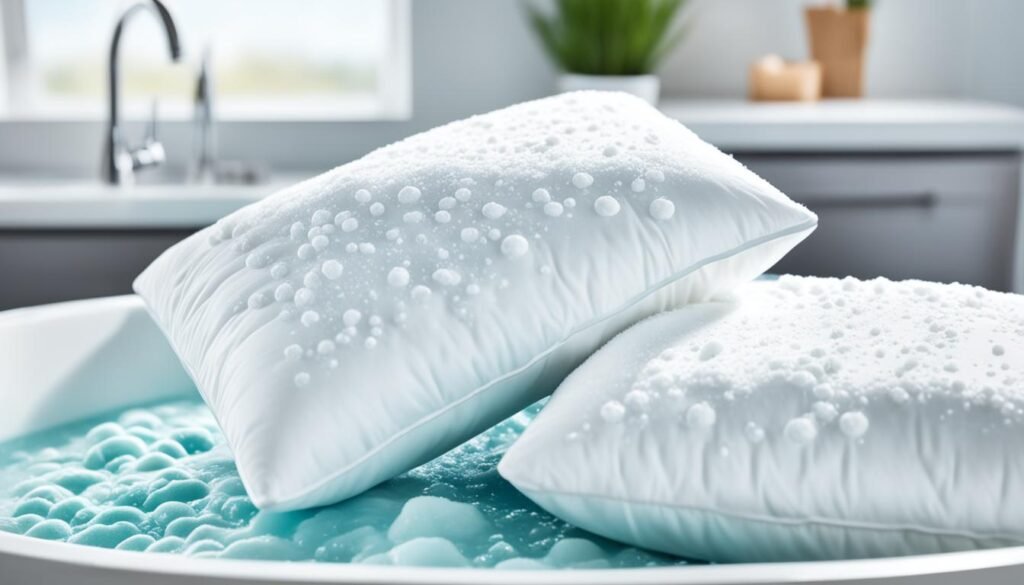
Different pillows need different ways to wash them properly. Cotton, feather, down, and synthetic pillows can go in the wash easily. But, memory foam and latex need careful cleaning. It’s best to wash them by hand or let a pro clean them.
Before you wash a pillow, look at its tag for how to clean it. Always use warm water and the gentle cycle. A bit of detergent and white vinegar can make your pillows smell great.
Feather and down pillows should be dried in a dryer on low. This makes them fluffier and keeps the filling even. Yet, memory foam and latex pillows must dry naturally. This stops them from getting ruined.
If you spill something on firm support, memory foam, or latex pillows, don’t panic. Just spot clean them using mild detergent. It works well to keep them looking good.
Summary of Pillow Washing Methods
| Pillow Type | Cleaning Method |
|---|---|
| Cotton, Feather, Down, Synthetic Fiberfill | Machine Wash on Gentle Cycle |
| Memory Foam, Latex | Clean by Hand or Professional Cleaning |
| Firm Support, Memory Foam, Gel, Latex | Spot Cleaning with Mild Detergent |
These tips will help keep your various pillows clean. Always follow the care label to make sure your pillows last a long time.
Pillow Care Tips
Keeping your pillows clean is more than just washing them. There are other things you can do. These pillow care instructions will help your pillows stay fresh and comfy for sleep. Consider these pillow maintenance tips:
- Use pillowcases or pillow protectors. They are the best way to clean pillows and keep them safe from sweat, skin cells, and bacteria. These covers stop dirt and oils from getting on your pillows.
- Give your pillows some fresh air every now and then. Take them outside on a sunny day. Fresh air gets rid of bad smells, keeping your pillows nice and fragrant.
- Don’t eat in bed. This habit can make a mess of your pillows. Try to eat meals in places other than where you sleep to keep your pillows clean longer.
- When you’re sick, remember to clean pillows more often. Change or wash your pillowcases a lot to stop germs from spreading. This is really important during illness.
- Keep your pillows in a cool, dry spot when you’re not using them. Too much moisture can cause mold. Storing pillows on a ventilated shelf or in a closet is best.
These pillow care tips will help your pillows last longer. They’ll also keep your sleeping space fresh and safe. Taking good care of your pillows is key to great sleep.
How to wash Pillows Care Tips
| Pillow Care Tips |
|---|
| Use pillowcases or pillow protectors to protect pillows from sweat, skin cells, and bacteria. |
| Air out pillows periodically to eliminate odors and keep them smelling fresh. |
| Avoid eating in bed to prevent crumbs, spills, and stains on pillows. |
| Wash or replace pillowcases regularly, especially when you’re sick, to prevent the spread of germs. |
| Store pillows in a cool and dry place to prevent mold or mildew growth. |
Conclusion
It’s very important to wash your pillows often. Doing this keeps your sleep area clean and comfy. You should clean them every three to six months. This will get rid of dust mites, bacteria, and oils. Make sure to check the label for care instructions for the best way to clean them.
Using pillowcases or protectors is smart. They protect your pillows from sweat, skin cells, and bacteria. Also, remember to air your pillows out from time to time. Try not to eat in bed as well. By taking care of your pillows this way, they’ll stay fresh, clean, and good for sleeping on.
Keeping your pillows clean makes your sleeping spot healthier. This leads to better sleep and health. So, remember to wash your pillows as part of your regular cleaning. This keeps your pillows nice and comfy for many nights to come.

